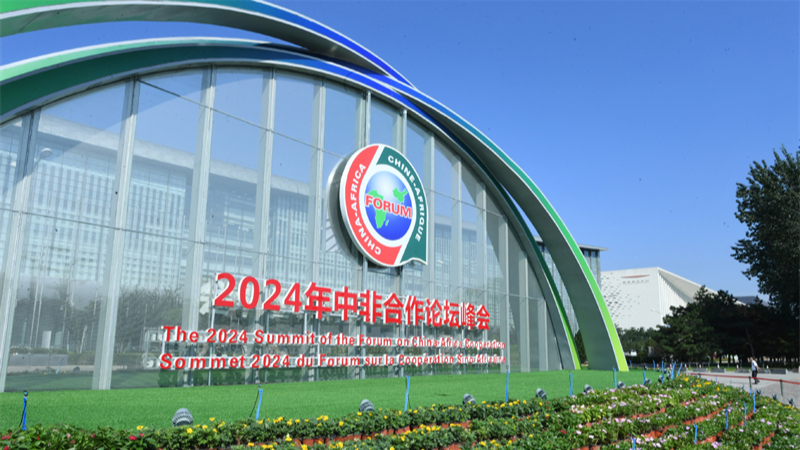
The logo of the 2024 Summit of the Forum on China-Africa Cooperation (FOCAC) near the China National Convention Center in Beijing, China, August 29, 2024. The FOCAC summit is taking place in Beijing from September 4 to 6. [Photo/Xinhua]
By Malik Ayub Sumbal
Beijing is all set to host African leaders at the landmark 2024 Summit of the Forum on China-Africa Cooperation (FOCAC), a key event aimed at deepening political and economic ties between China and African nations.
This summit marks a significant step forward in the ongoing efforts to foster a shared future destiny based on mutual respect and benefit. As Beijing rolls out the red carpet for African leaders, the forum is set to become the biggest participation of African leaders outside of the African Union.
China-Africa cooperation through FOCAC will not only deepen the existing economic and political bonds, but also elevate the strategic partnership between the two regions. African nations, endowed with rich natural resources, have been historically exploited by the United States and some other Western countries. In the past decades, African nations have increasingly turned towards China for cooperation that promises win-win outcomes. This shift represents a collective move towards setting up partnerships that benefit both sides equally.
A comparative analysis of China's cooperation in Africa and the Western exploitation of African resources reveals a stark contrast in the approaches of the two. Beijing's strategy in Africa is fundamentally different, focusing on mutual benefit and respect. In contrast, the colonial and post-colonial approaches of the U.S. and other Western countries have often led to setbacks, best illustrated by France's recent challenges in the Sahel region of Africa.
China's involvement in Africa is most visible through its investments in infrastructure development. Under multiple programs, including the Belt and Road Initiative (BRI), China has significantly contributed to developing and upgrading infrastructure across the continent. The construction of roads, bridges, railways, and other key infrastructures has facilitated faster transportation and improved communication networks in many African countries. Ranging from Djibouti in the northeast to Nigeria in the west and Angola in the south, about 50 countries across the continent are witnessing rapid infrastructure development through Chinese support. New electricity projects, seaports and airports, highways and water supply projects are aimed at sustainable development instead of extraction alone.
China's contribution extends beyond infrastructure into critical sectors such as health. The Chinese government has played a crucial role in upgrading healthcare facilities and addressing epidemics across Africa. This support has been instrumental in improving the overall health standards in many regions. During the COVID-19 pandemic, Chinese support for African nations demonstrated a sense of humanity and shared friendship beyond borders.

A car passes by a speed sensor on a section of a Chinese-built road inside Murchison Falls National Park in northwest Uganda, May 11, 2024. [Photo/Xinhua]
Education is another area where Africa has benefited from its cooperation with China. African students who have been awarded opportunities to study in China's universities have been equipped with knowledge and skills to contribute to their countries' development.
In times of emergency or calamity, China has consistently been among the first nations to respond, and it has done so remarkably swiftly. Whether it's a natural disaster, health crisis, or humanitarian emergency, China has demonstrated its commitment to swiftly providing aid and support to affected regions. The prompt dispatch of medical teams, relief supplies, and financial assistance has often made a significant difference in mitigating the impact of these crises.
China not only supports African nations through emergency aid, but also through various grant projects aimed at supporting welfare projects throughout the continent. Even in the post-pandemic era, China is leading the way through various programs to support governments in their economic recovery efforts. This proactive and compassionate approach has further solidified China's reputation as a reliable partner in Africa, one that stands by its commitments not only in times of prosperity but also during challenging periods.
Trade between China and Africa has also reached new heights, with China being Africa's largest trading partner. In the first seven months of 2024, China's imports and exports to Africa reached 1.19 trillion yuan ($167 billion), a year-on-year increase of 5.5 percent. The implementation of a free trade agreement among African nations could help China and Africa strengthen trade relations more sustainably. Given that China is viewing Africa as a long-term partner, there is a possibility of more diversified and balanced growth in the economic and trade sectors.
China's approach to Africa is driven by a vision of mutual development and engagement, in stark contrast to the historical exploitation by Western powers. Beijing's commitment to fostering partnerships that benefit both sides reflects a broader strategy of building long-term, sustainable relationships based on respect, equality, and shared goals.
As 2024 FOCAC unfolds, it will be clear that the China-Africa relationship is poised to reach new heights, setting the stage for a future of strategic cooperation and mutual prosperity.
Malik Ayub Sumbal, a special commentator on current affairs for CGTN, is an award-winning journalist, geopolitical analyst and author of the book Tovuz to Karabakh, A Comprehensive Analysis of War in South-Caucasus.

 中文
中文



